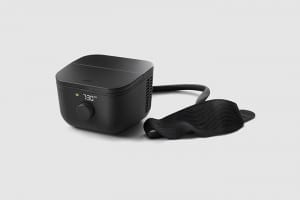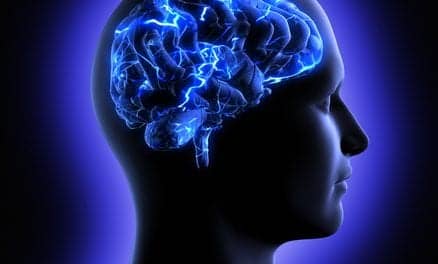Sleep specialists in attendance at SLEEP 2017 in Boston earlier this month were among the first to experience the technology behind Ebb Insomnia Therapy. Cleared by the FDA, Ebb Insomnia Therapy reduces latency to Stage 1 and Stage 2 sleep.
Later this year, Ebb Therapeutics (formerly Cerêve) will begin offering Ebb Insomnia Therapy to select sleep centers as manufacturing is scaled, with national availability planned for 2018.
Protected by 9 issued and 23 pending patents, Ebb Insomnia Therapy is a software-controlled bedside device that cools and pumps fluid to a forehead pad that is worn through the night. The inspiration behind Ebb Insomnia Therapy came from functional brain imaging studies conducted at the University of Pittsburgh by Eric Nofzinger, MD, founder and chief medical officer at Ebb Therapeutics. Three independent clinical studies conducted over 3,800 research nights demonstrated the safety and efficacy of this novel device.
“Patients with insomnia often describe ‘racing minds’ that prevent them from sleeping soundly,” says Nofzinger in a release. “My functional brain imaging studies confirmed that the frontal cortex, or executive brain, stays active in people with insomnia during sleep, preventing them from getting deeper, more restorative sleep. Our clinical studies have demonstrated that by gently cooling the forehead within a precise therapeutic range, Ebb Insomnia Therapy allows insomnia patients to fall sleep faster.”
On the evening of June 4, Nofzinger gave a poster presentation for conference attendees titled A Novel Forehead Temperature Regulating Device for Insomnia: A Randomized Clinical Trial. The presentation summarized a clinical study of Ebb Insomnia Therapy, conducted at 7 clinical sites across the United States. The study included a randomized, placebo-controlled trial collecting polysomnographic sleep measurements in 106 adults with primary insomnia. Results of the study showed a statistically significant reduction in latency to Stage 1 sleep, the time it takes to get into the first stage of sleep, as well as latency to Stage 2 sleep, a deeper stage of sleep that typically represents over half the night. Authors of the study included Thomas Roth, PhD; David Mayleben, PhD. Neil Feldman, MD; Alan Lankford, PhD; Timothy Grant, MD; and Nofzinger.
Additionally, patients who tried Ebb Insomnia Therapy reported improved quality of sleep after 30 days of in-home use and found it was easy to use and wear, creating a calming and comfortable experience. Ebb Insomnia Therapy has also been found to be safe over six months of in-home use.
“Knowing 55 million Americans are living with insomnia, Ebb Therapeutics is working diligently to bring our new technology to market to relieve the suffering experienced by so many,” says Don Spence, CEO at Ebb Therapeutics. “Sleep is a vital pillar of health, along with diet and exercise, yet the current therapeutic options available to physicians and insomnia patients are limited, many leading to unwanted side eff ects. Ebb Insomnia Therapy is safe, free of significant side effects and will address an important clinical need by quieting the racing minds of insomnia patients, helping them fall asleep faster and get the rest they need to take on tomorrow.”
Ebb Therapeutics announced in January that it closed a $38 million Series B round of financing led by global investment firm KKR. Ebb is initially deploying this funding to build out its infrastructure in preparation for product launch.






Please update on latest technology
Could I use this along with a full-mask c-pap?
I would like more information on this product & if this product is available in San Antonio, Texas.